
30 minute read
Community Counts
The Student Action Committee Takes the Lead
FREED SPIRIT PHOTOGRAPHY
Advertisement
hanging the world
Ctakes more than vision. The commitment to lasting change demands dedication from a coalition of changemakers who put in the hours, do the unglamorous behind-the-scenes legwork, build upon incremental gains, and foster engagement from folks who will follow in their footsteps. Founded during the 2019–20 school year by Anoushka Chander ’21, the Student Action Committee (SAC) has become both the hub and the engine for High School student-led advocacy, activism, and changemaking.
During the club’s inaugural year, students lobbied policymakers on Capitol Hill regarding three specific gun violence bills (known as the violence deescalation act, the assault weapons ban, and the extreme risk protection orders), took on Tenleytownbased shops selling vaping products in the school-packed Wisconsin Avenue corridor, and gave testimony during the public hearing of DC Council’s Committee on the Judiciary and Public Safety potential ban of flavored e-cigarettes in the city.
Anoushka Chander ’21 Maddie Feldman ’22
Spanning two impeachment trials, a Supreme Court justice confirmation, a presidential election, a double Georgia Senate runoff, a turning point in the battle for DC statehood, the COVID-19 pandemic, the nation’s reckoning with racial injustice, and the school’s intentional focus on civic education, the 2020–21 school year saw significant growth in the activity of the SAC.
Maddie Feldman ’22 and Leo Cooper ’22 mail postcards to GDS seniors. With support from High School faculty and staff allies and a close partnership with the Office of Community Engagement and Experiential Learning, the SAC launched a Voter Mobilization Initiative (VMI) to combat rampant voter suppression efforts and historic voter disenfranchisement. Maddie Feldman ’22 and Anoushka co-led the effort, building an impressive infrastructure of subcommittees and, ultimately, a massive volunteer coalition of students from both GDS and peer schools that are literally across the country. Alongside Maddie and Anoushka, subcommittee leaders Ella Farr ’21, Elliot Oppenheim ’21, Jonah Shesol ’22, Liana Smolover-Bord ’21, and Nolan Sheridan ’21 coordinated impactful advocacy around voter education, registration, and legislation. Interim director of community engagement and experiential learning Leigh Tait, High School civil rights and math teacher Andy Lipps, and GDS chief of staff Lauren Dickert joined and supported students in dozens of meetings as they connected virtually with congressional staff, launched a 200-student-strong force to replace poll-watching volunteers at local polling precincts who were at high risk for contracting COVID-19, disseminated DMV voter information in a year of pandemic-era voting process changes, and worked to activate voters in historically disenfranchised areas.
In December 2020, Maddie said, “Looking ahead...the Voter Mobilization Initiative hopes to focus its efforts entirely on addressing the widespread voter suppression interwoven into the fabric of this country. We hope to begin lobbying for a restoration of the Voting Rights Act and, more specifically, with the help of various voting rights organizations, lobby for DC statehood.
Thanks to widespread voter outreach these last few months, I now have contacts at schools across the country that I can use to expand this teen lobbying operation to a national level.”
As Maddie promised, the SAC’s DC statehood lobbying efforts took off this spring with training sessions for more than 20 GDS High School students, as well as for nearly a dozen Middle School students as part of the 7th and 8th grade Days of Doing action projects. After three weeks of preparation, students as young as 13 presented with the team to staffers from the offices of Representative and Lead Impeachment Manager Jamie Raskin ’79, Senator Ben Cardin, and Representative Eleanor Holmes Norton. (SAC members and student fellows from the GDS Policy Institute also coached 8th graders in advance of their Hill Day virtual visits with advocates on both sides of seven major constitutional issues.) Most recently, the SAC has turned its DC statehood efforts to persuading senators in other states, whose support for the DC statehood bill S.51 will be critical for its passage.
In spite of all that has come at students this school year, it’s safe to say they have not waited passively for the world to remake itself. Instead, they’ve taken the lead. With dedicated faculty and staff partners, in collaboration with a cohort of committed peers, and using all they have learned about making positive change in the world, the SAC is facing down many of the central challenges in our city.
Its actions communicate powerfully to policymakers and other advocates what most of us at GDS already know—that the young people are paying attention and won’t tolerate inaction. Not only are GDS students learning to change the world, but they are actively doing so—in and beyond the classroom—and training future leaders to follow their lead.
Mark Orr ’24 with one of the VMI’s posters outside a polling place. High School students on a pre-lobbying call.
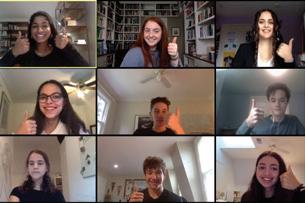
GDS-LED PHONE BANKING BY THE NUMBERS
More than 130 STUDENTS from 10 STATES, THREE TIME ZONES, and 18 SCHOOLS made...
more than 10,000 CALLS to historically disenfranchised voters in key states…
for a total of 62 HOURS of Zoom phone banking after 26 TRAINING SESSIONS.
(25% of which provided BIPOC voters in Georgia with information about casting their ballots in the Senate run-off races.)
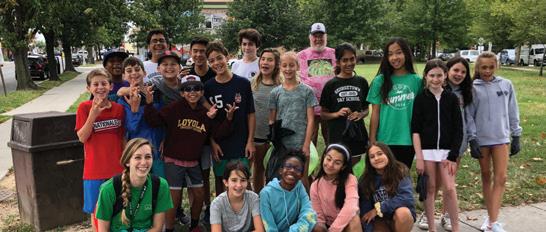

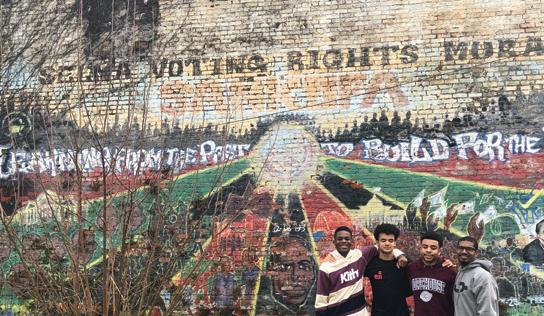
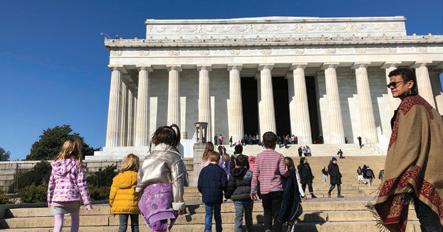
The Center for Civic Engagement
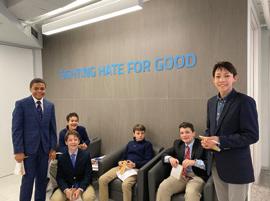
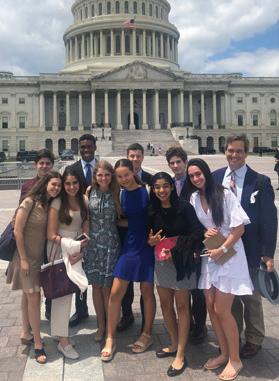
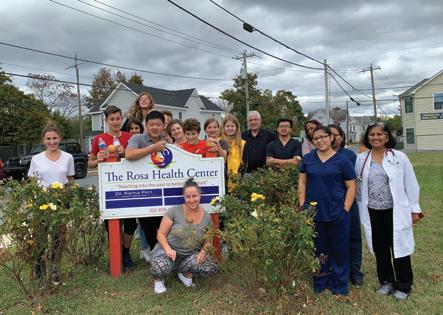
Since he first proposed his ideas for a Center for Civic Engagement to the Board of Trustees at the start of the 2019–20 school year, Head of School Russell Shaw and school leaders have explored the ways GDS’s mission-driven work could spark a focus on public purpose with broad-reaching dialogue and advocacy beyond GDS.
With some of our most basic assumptions about democracy in America badly shaken in recent years, much of our ability to communicate across lines of political difference and find common ground in this country has eroded. Yet, today, as it did at its founding, GDS strives to train the game-changing leaders of tomorrow to wade into the great conversations of our time, reaching across racial, economic, and cultural divides, to bring much-needed change to a troubled world.
GDS’s work to educate young people to believe in—and participate in—our democracy continues so that students and alumni can do their parts to deliver on our nation’s promises of liberty, equality, and justice.
With the blessing of the Board, Russell and school leaders have now formally introduced the Center of Civic Engagement at Georgetown Day School to the GDS community, established its founding principles, hired a founding director and program associate, launched a faculty and staff task force, hosted an event about the For the People Act, and begun to engage the community in defining all that the Center will be.
“Drawing on GDS’s unique history at the nexus of education and democratic engagement in the nation’s capital, we recognize that while this work has always been in our DNA, we must scale up our efforts to meet this moment,” said the newly appointed founding executive director of the Center, Barbara Eghan, who has served for seven years as GDS’s director of enrollment management and financial aid. “We believe that young people can be engines for positive change—and with the Center for Civic Engagement, we aim to create a new civic platform that engages community partners in the DMV and beyond to educate and inspire the next generation of civic leaders. The Center will equip them with the skills, opportunities, and networks to address the most pressing social challenges that undermine the health of our democracy.”
During the 75th Anniversary Speaker Series panel discussion, “Philanthropy in a Time of Social, Economic, and Political Unrest,” Russell introduced the Center to Ford Foundation President Darren Walker, Annie E. Casey Foundation President and CEO Lisa Hamilton, and Skoll Foundation CEO Don Gips, all leaders of organizations committed to social impact. Russell said, “We want to be part of helping train changemaking leaders of tomorrow. What are the Barbara Eghan and capacities or skills that changemakers Russell Shaw are going to need? Who are you going to want to hire? What are the things they are going to need to know how to do?” “I would suggest you engage young people in the creation of it because they are never short on great ideas about what can be,” Lisa said, before naming data analysis skills and storytelling as essential skills for changemakers. “Teach students how to listen and not focus on trying to solve somebody’s problem but to empathize with where others are coming from,” Don said. “Starting with that opens up the doors to the real conversations we have to start having.” Darren offered a caution and reminder that co-creation is foundational to social impact work. “Privileged institutions, even progressive ones like the Ford Foundation, have learned a lot from our
impulse to want to do good in the world and how that can actually turn to harm if the path to doing that doesn’t start with the people we want to impact,” he said.
The four pillars anchoring the Center’s work— dialogue, equity, experiential learning, and partnership—will be guided by this caution to proceed with humility, along with an abiding commitment to empathy rather than a determination to jump in with solutions to other people’s problems.
Current students expressed enthusiasm for the unveiling of plans for the Center. “I am so excited about the Center and Barbara’s leadership,” said Anoushka Chander ’21, founder and outgoing head of the High School Student Action Committee. “I had the privilege of attending the Center’s opening event...and already could tell how impactful the Center is going to be for providing GDS students with education and advocacy opportunities. I am also excited to learn that the Center will not just serve GDS students, but also other students in the area, as collaborations are super important. As I graduate, I hope to still be involved with the Center and provide advice or talk to current students about political advocacy!”
Barbara noted that the Center will also be a key partner in GDS’s DC-area launch of the “Can We?” Project, an immersive student experience in civic dialogue established in Maine by Waynflete to “harness the wisdom and power inherent in the great diversity of the American people to revitalize our democracy, mend the social fabric, and live out the true meaning of the American promise of liberty and justice for all.”
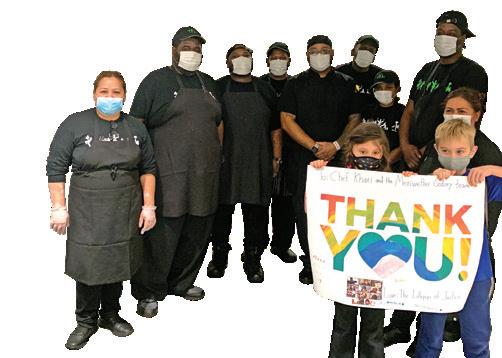
“For all the positive introspection that occurs at GDS, the Center provides an incentive to turn outward—to step away from what is safe and small and toward what is messy and difficult,” said Nick Penniman ’22, who participated in Can We. “It’s exciting—and it’s necessary. There’s a certain appeal to the notion that all we need to do to improve the world is find more people like ourselves and work with them. As the Can We Project and the Center propose, people who are unlike ourselves have things to teach us. I couldn’t be more invested in the goals of Can We and the Center, and I don’t think that’ll change anytime soon. Engaging in democracy is a lasting obligation, not a high school hobby.”
At the Intersection of Faith and Diet
As part of the annual, yearlong Identity Project, 2nd grade turned its attention to traditions, beliefs, and religion in November 2020. The full grade joined together to welcome a panel of speakers connected to the GDS community to talk about the intersections of their faith and other aspects of their identities.
Students engaged with GDS parent Rabbi Shira Stutman (Natalia ’25, Maya ’22, and Caleb ’20) who shared that her religion provides moments of joy, family togetherness, and help in times of sadness. Faculty spouse Khashayar Bayani (2nd grade teacher Sasha Shahidinejad) explained that he finds purpose in service to others through the Baha’i faith. Giovana Williams, who is Black and Mormon, discussed the togetherness she valued in the church community she grew up in. Students commented with connections to their own traditions or values, and they asked follow-up questions to learn more about things that were different from their own identities. “What is baptism?” some students asked. “What do you mean when you say you grew up in the church?” asked another.
Second grade teacher Azurée Harrison’s homeroom spent time learning about religions that have dietary guidelines, such as eating Kosher foods (Judaism), eating Halal foods (Islam) and practicing vegetarianism/
veganism (observed by some who practice Hinduism).
After learning about these dietary guidelines, the class visited with our own Chef Khari Bell to hear about GDS partner Meriwether Godsey’s intentionality in providing menus with diverse options to GDS. Chef Khari talked to the kids about food selection and preparation and then explained about all of the day’s menu options and the ingredients in each.
ESSENTIAL QUESTIONS
1) How do students’ religious and cultural backgrounds affect them at school?
2) What dietary rules do different religions have?
3) How can school cafeterias accommodate and respect students from diverse ethnic and religious backgrounds?
Returning to class, the students discussed whether those who identify with each of the three religions of focus would have lunch options. They were pleased to conclude that Meriwether Godsey at GDS provided two or more options for lunch that were suitable for each faith. Much to the delight of the entire dining staff, the students delivered a signed poster as a gesture of thanks for their time and the exchange of knowledge at the intersection of faith and diet.
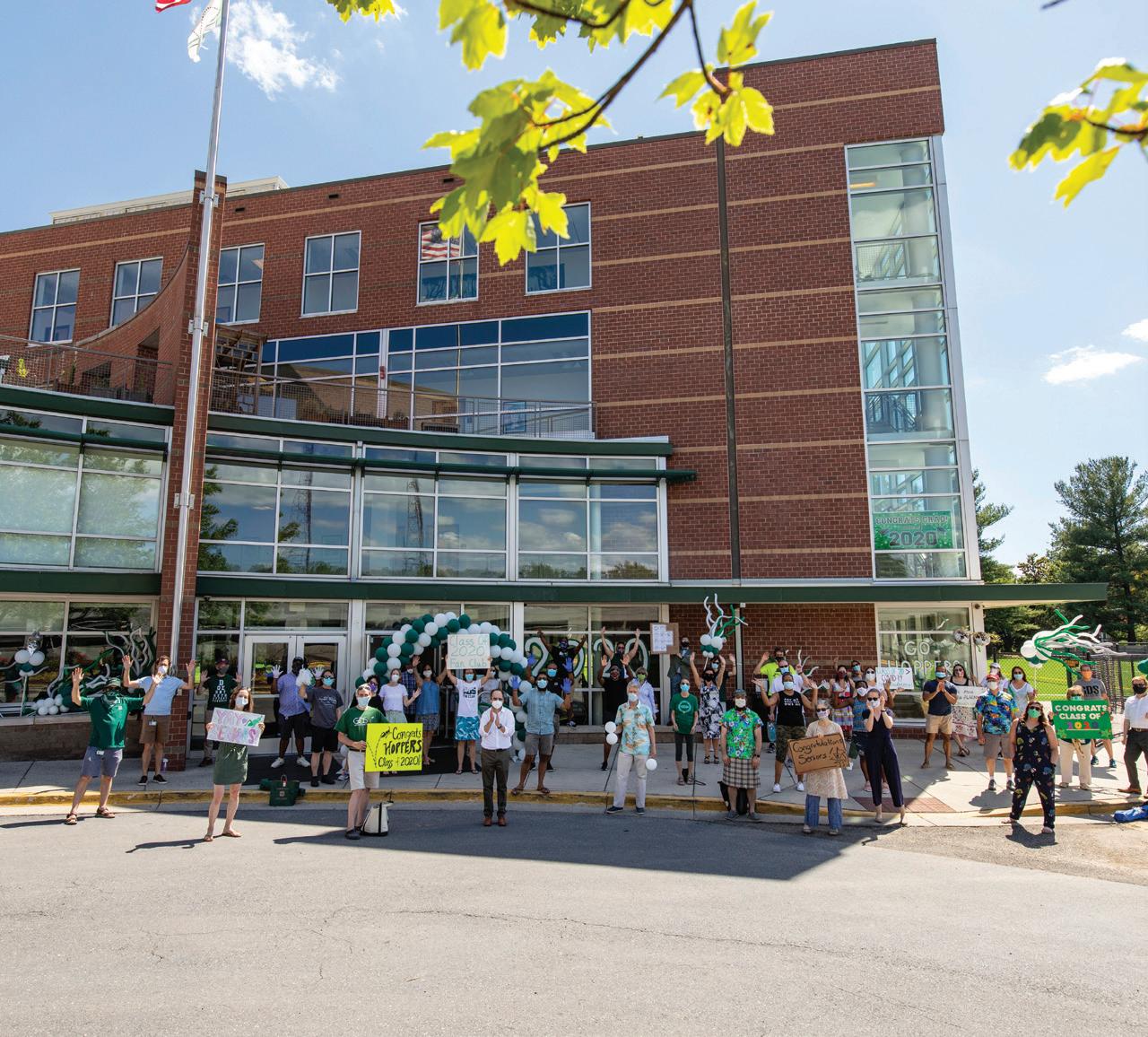
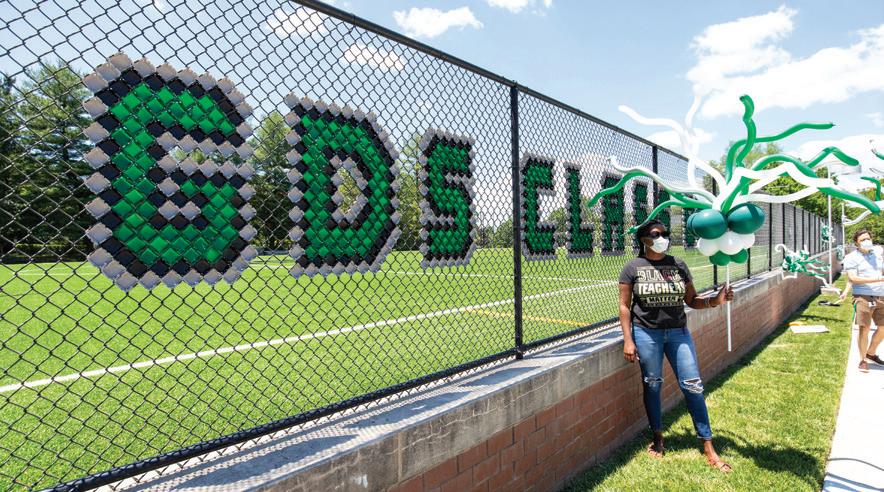
All Class of 2020 drive-thru photography courtesy of Jason Putsche Photography
GRADUATION 2020
AN EVENT OF PANDEMIC PROPORTIONS
On August 2, Georgetown Day School celebrated the Class of 2020 with an all-virtual graduation ceremony, per public health guidelines from the DC government during the
COVID-19 pandemic. Earlier, GDS celebrated the seniors with an in-person “Summer Send-Off Drive
Thru” on June 7, during which students received diplomas, a gift basket, and the raucous cheers of faculty and staff who stood well-distanced along the sidewalks.
During the August virtual gathering, students joined their peers, families, faculty, and the six graduation speakers for a mix of live and pre-recorded content marking the occasion—a momentous one given their tumultuous senior year.
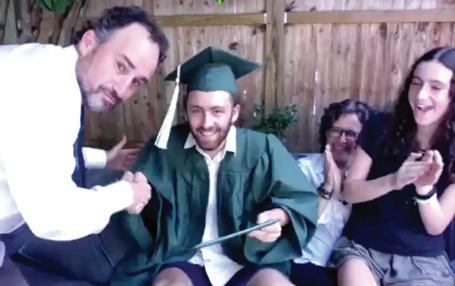
Head of School Russell Shaw was able to shake one graduate’s hand live...his son Caleb Stutman-Shaw ’20. Head of School Russell Shaw (parent of Caleb ’20, Maya ’22, and Natalia ’25), delivered his 10th graduation speech, which was not only his first virtual address but—as he noted in his closing remarks—the first graduation ceremony in which he left midway through to search for a missing diploma in his graduating son’s bedroom.
In his speech, Russell spoke of “world-reshaping” events that have powerfully and painfully bookended the lives thus far of the Class of 2020. As in the long life of trees, these events and others leave indelible rings, Russell explained.
“Each of you was born in the shadow of 9/11, a world-reshaping event that taught us something about fear and fundamentalism, about hatred and hope, about interconnectedness, and more. There’s a ring at the very center of your trunks formed powerfully by September 11, 2001. Your current outer ring, the one that is just under the bark, and that is coinciding with your graduation, is also being shaped by global events, in this case by two of them. Your ring for the year 2020 is being formed by a globally defining pandemic, and by a national awakening around racial justice.”
Russell noted that the Class of 2020 is connected by those rings and also by the interconnected roots of personal relationships and what seniors “carry with them” from their shared GDS experience. As he does every year, Russell elevated the voices of some of the seniors who had written to him to share what they were carrying with them.
Ethan Sze: “GDS has taught me to believe in myself. To put faith in myself. To be confident. To be proud of who I am...I leave GDS with the same goofy smile but also with a sense of purpose. A purpose to always do better, to always be better.”
Sophie Schiff: “GDS has taught me that I have a voice and I must use it... Thank you, GDS. (I can’t wait to send my kids here!)”
Julia Hay: “I think what I will take most from GDS is the spirit of never settling for just good enough...In the same way GDS is striving to be [an anti-racist institution], I have learned to strive to become a more intersectional activist who puts actions behind my words.”
Berret Yuffee: “Every lesson, memory, and friendship is coming with me in the fabric of my body and mind, and when I make my mark on a world larger than my current one, however big or small that mark will be, GDS will be there too.”
Nyah Mays: “I would have never become the strong and independent person I am today without the help and support of my friends and peers. I would not be as optimistic during this time if it was not for the GDS community. GDS will be a second home to me for the rest of my life."
Lila Brown: “I have learned the importance of activism for and with people who are different from me. GDS has taught me the strength in a diverse group coming together to fight against injustice...Being an advocate and a good global citizen is, more than anything, about paying attention and speaking up.” Isaiah Schuham-Anders: “I will take the ability to create safe spaces for people in order for them to talk about sensitive issues. By creating those spaces, it will allow me to find those I can trust so that they and I will not feel alone.”
Sasha Freedman: “From my GDS education, I’ve gained core values that I will take with me for the rest of my life—to prize curiosity, to always respect and see the dignity in others, to advocate for myself, to love learning, and to be supportive of my peers.”
Sami Jinich: “I will take with me a sense of purpose that has driven me throughout High School and that will continue to drive me for the rest of my life to make this world a better place by helping to amplify the voices of people from all over the world and from different cultures and backgrounds.”
Talia Rodriguez: “While I don’t think GDS explicitly taught me how to bear the emotions of having a pandemic end my senior year, I do believe it has taught me to think beyond that. To understand that I have a duty to heal the world that is going to be much more broken than I thought it would be a couple of months ago. And to understand you can’t ever fully say goodbye to a place, a community, that is part of your being.”
Noelle Sanderson: “Whether I am personally affected by an issue or not, I leave GDS with the ability to listen, understand, and strategize a plan to move forward...I cherish my ability to think critically about the world that surrounds me, and truly do not think I would be the person I am today without being able to call this community my home.”
High School Principal Katie Gibson (parent of Joy ’27 and Oliver ’30) turned to the wisdom of the Black feminist thinker and scholar bell hooks in her address to the graduates. “In her collection of essays Killing Rage: Ending Racism, hooks writes: ‘Beloved community is formed not by the eradication of difference but by its affirmation, by each of us claiming the identities and cultural legacies that shape who we are and how we live in the world.’ hooks’s words move me on multiple levels.”
Katie spoke of GDS’s work to create spaces where people “feel loved, heard, honored, and affirmed,” and acknowledged the “vigilant self-reflection” needed in the school’s work ahead. She also asked the graduates to remember “all of the ways in which this community held you, challenged you, and inspired you.”
In closing, Katie invoked the late Congressman John Lewis’s words: “Do not get lost in a sea of despair. Be hopeful, be optimistic. Our struggle is not the struggle of a day, a week, a month, or a year; it is the struggle of a lifetime. Never, ever be afraid to make some noise and get in good trouble, necessary trouble.”
Faculty speaker jon sharp, nominated by the Class of 2020, illuminated the contrast between the kind of celebration—the kind of world—they deserved and the “dumpster fire” the world has given them. He spoke of how they have been thrown headlong into a “metastasizing second American Civil War.”
jon also assured the Class of 2020 of his utter confidence in them to meet the moment. The graduates will be like entangled quantum particles, he explained: “Regardless of how much time passes, it is never possible to genuinely and definitively separate those particles again...We are all particles in this, my friends.” He reminded them that this world on fire is also the world that produced them. “That world cannot be all bad,” he said.
The first of two student speakers, Margaux Van Allen, carried the online audience through stories of her not-as-“slick”-as-she-thought 6th grade self and her current affection for the imperfect place that is GDS. “The mere idea of this school wanting to make us safe is immensely important,” she explained. “I understand that a lot of you know that is not enough, and as a result of that, you guys have done what GDS has taught us best. Criticize! If there is something wrong about the action taking place, GDS kids are more than eager to point it out and correct it...I see people making an effort to educate themselves and others. I see people going out together and protesting. I even see people making short films about mass incarceration and the prison system. It feels so immensely impactful and motivating to see this kind of outcry. It tells me that we have a ton of work to do, but thank god I am not alone. This is where the beauty of GDS manifests: it is not just the institution, but also in the loud people within it.”
Student speaker Margaux Van Allen ’20
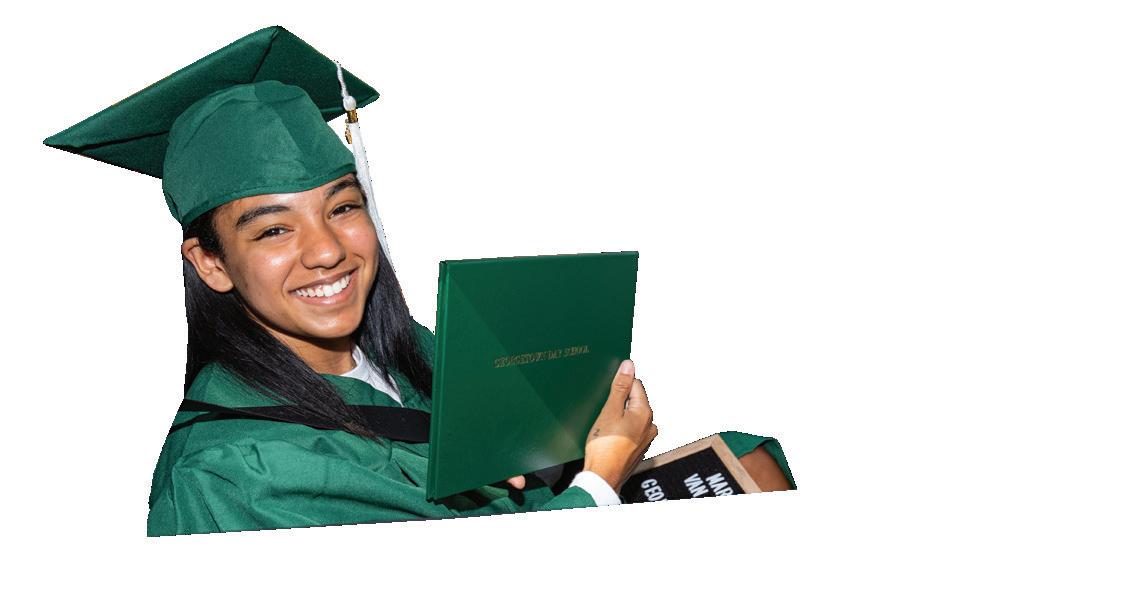
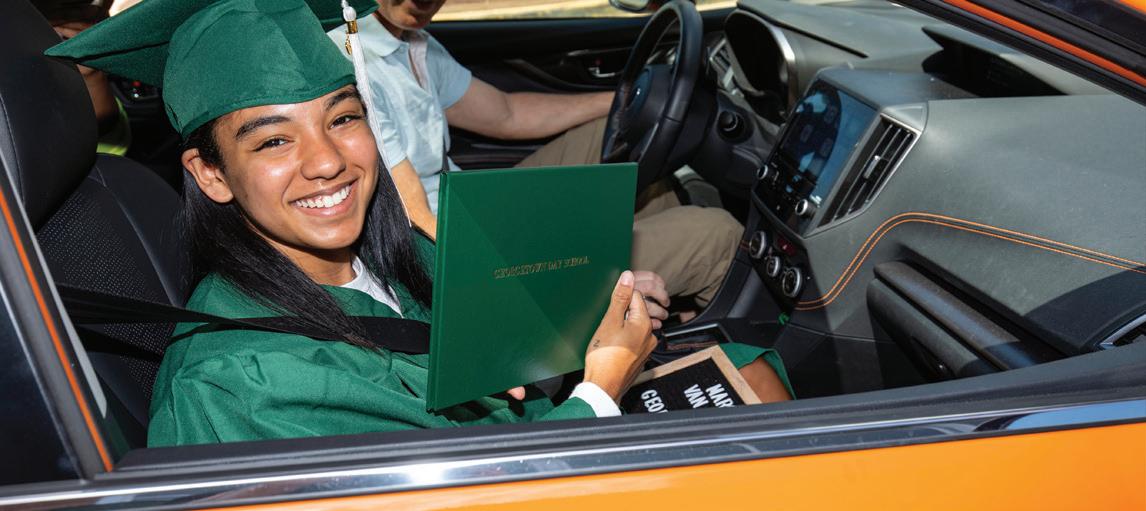
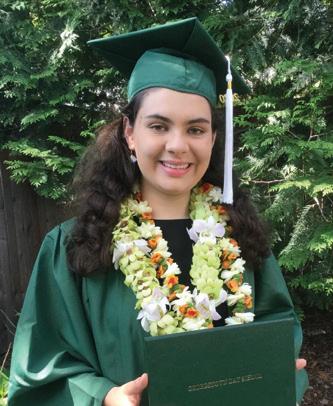
Student speaker Gigi Silla ’20
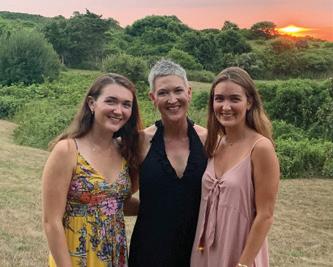
Parent speaker Jennifer Griffin with daughters, graduate Amelia Myre ’20 and alumna Annalise Myre ’19 Student speaker Gigi Silla illustrated the concept of “solastalgia,” a term she explained as “a combination of solace, desolation, and nostalgia that describes the particular emotional distress and disorientation that arises when familiar surroundings become unrecognizable.” It is an experience, she explained, inhabited by the contradictions of homesickness without leaving home and of physical separation in the midst of unprecedented camaraderie in social movements.
Gigi merged Toni Morrison’s oft-coined statement “If there’s a book that you want to read, but it hasn’t been written yet, then you must write it” with the story of Australian environmental philosopher Glenn Albrecht who, along with his wife, created the term “solastalgia.” Gigi said, “I hope in the upcoming chapters of our lives, we can all take a page from Morrison and Albrecht and not only write the books we want to read but also create the languages necessary to write them.”
Parent speaker Jennifer Griffin (parent of Amelia ’20, Annalise ’19, and Luke ’27) has served as national security correspondent for Fox News Channel since 2007. She worked overseas as a foreign correspondent for 15 years, covering the rise of the Taliban, the transition from Boris Yeltsin to Vladimir Putin, Yasser Arafat’s funeral, and the evacuation of Jewish settlers from Gaza.
Twenty twenty, Jennifer noted to the graduating class, is “an epic number” that “implies clarity.” It has been, she said, “an unforgettable year...a year no one could have envisioned with 20/20 vision.” Jennifer shared that the graduates’ surreal senior year reminded her of her father’s Naval Academy Class of 1947, who all missed the final year at the Academy because they were needed at war in the Pacific. She closed her remarks by describing the Hebrew term “Tikkun Olam,” meaning “repair the world.” The Jewish concept is “defined by acts of kindness performed to perfect or repair the world.” She offered “Tikkun Olam” as the next challenge for the Class of 2020, a class she called “The Phoenix Generation,” which will “rise out of the ashes of what we have left for you.”
“You missed your graduation,” she said, “but your reunions will be legendary.”
As the names of each graduate were read, some waved their diplomas (in at least one case very recently located), some were hugged by a pod of family members crushed together on a single couch, and many donned the traditional GDS Hopper green caps and gowns for graduates.
Russell closed the ceremony with congratulations to the graduates and a pledge of ongoing support from him, the School, and all those assembled on this occasion. He read his traditional closing poem by Mary Oliver. “The Summer Day” is about a grasshopper flinging herself out into the world, about gratitude, and above all, about paying attention in our “one wild and precious life.” He invited the graduating class to throw their caps in celebration, and the caps ricocheted happily off of computer monitors and family members’ heads with all the pomp and circumstance that Zoom could muster. Congratulations, Class of 2020!
The full recording of the virtual graduation ceremony as well as full texts of all the speeches are available at www.gds.org/HSgraduation.
WHAT CAME NEXT FOR THE CLASS OF 2020
At the beginning of the college process, students have a world of possibility and often have a few ideas of their preferences for college. While the end of the college process looked very different for the Class of 2020 than they could have imagined when they began, they remained engaged, invested, and excited to think about their journey through the college process and next steps, even in a time of great uncertainty.
There is no class that has had to embrace that journey and all its twists and turns like the Class of 2020. Right as seniors began to receive their final college admissions decisions in March 2020, seniors found themselves at home, unable to travel and to investigate their options in person. The resilience, flexibility, and humor that the Class of 2020 showed in the quick pivot from in-person meetings to daily Zoom classes and meetings, as well as their continued thoughtful approach to decision making, was remarkable. They engaged with virtual admitted student programs, connected with GDS alums at the colleges they were considering, and more than ever, they centered their values and goals and made choices that were best for them.
At the end of the day, the Class of 2020 (128 students) enrolled at 73 different colleges and universities across the United States, Canada, and the UK. They are studying music performance, engineering, and fine art, among other academic pursuits. They have chosen colleges in small towns and in major cities. Each year, a number of students choose to delay their enrollment and take a gap year, and the Class of 2020 was no different in that regard. From cooking courses to political campaigns, students found creative ways to spend their year off.
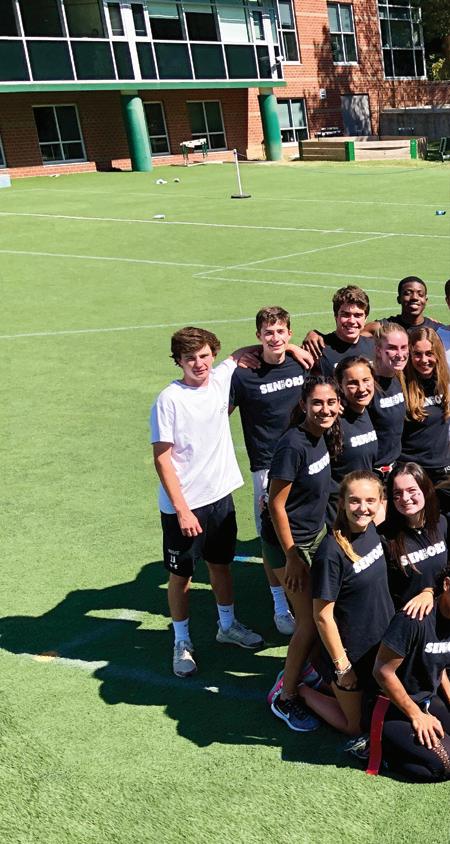
A successful college process at Georgetown Day School is about students:
• Believing in their own ability to navigate a complex process • Articulating who they are (in flux) and who they want to become • Developing goals for the college experience beyond admission • Making decisions grounded in their own values • Building skills for success beyond high school and college, such as self-reflection, resilience, and decision making • Celebrating good matches and each other’s individual choices
WEST
Pomona College – 3 Santa Clara University – 1 Stanford University – 2 University of California, Davis – 1 University of Colorado at Boulder – 1
FACTS
ABOUT THE CLASS OF 2020 128
Students
APPLIED TO 188
Different Colleges and Universities
Carleton College – 1 Case Western Reserve University – 1 Indiana University, Bloomington – 1 Kenyon College – 1 Northwestern University – 3 Oberlin College of Arts and Sciences – 1 Purdue University – 1 The College of Wooster – 1 The Ohio State University – 1 University of Chicago – 1 University of Michigan – 4 University of Wisconsin, Madison – 5 Washington University in St. Louis – 4 Barnard College – 1 Boston College – 1 Boston University – 1 Brandeis University – 1 Brown University – 3 Bryn Mawr College – 1 Caldwell University – 1 Colby College – 1 Columbia University – 3 Cornell University – 2 Dartmouth College – 2 Fordham University – 1 George Washington University – 2 Harvard College – 5 Haverford College – 5 Lafayette College – 2 McDaniel College – 1 New York University – 6 Northeastern University – 1 Pennsylvania State University – 1 Pratt Institute – 1 Princeton University – 1 Rhode Island School of Design – 1 School of Visual Arts – 1 SUNY Binghamton – 1 Swarthmore College – 2 Syracuse University – 1 The New England Conservatory of Music – 1 Tufts University – 1 University of Pennsylvania – 1 University of Pittsburgh – 2 University of Rochester – 1 Vassar College – 2 Wellesley College – 2 Wesleyan University – 2 Williams College – 2 Yale University – 3
SOUTHEAST
Davidson College – 1 Duke University – 2 Emory University – 2 Georgetown University – 4 University of Louisville – 1 University of Maryland, Baltimore County – 1 University of Maryland, College Park – 2 University of Miami – 4 University of Virginia – 1 Vanderbilt University – 1 Virginia Commonwealth University – 1 Wake Forest University – 1 William and Mary – 1
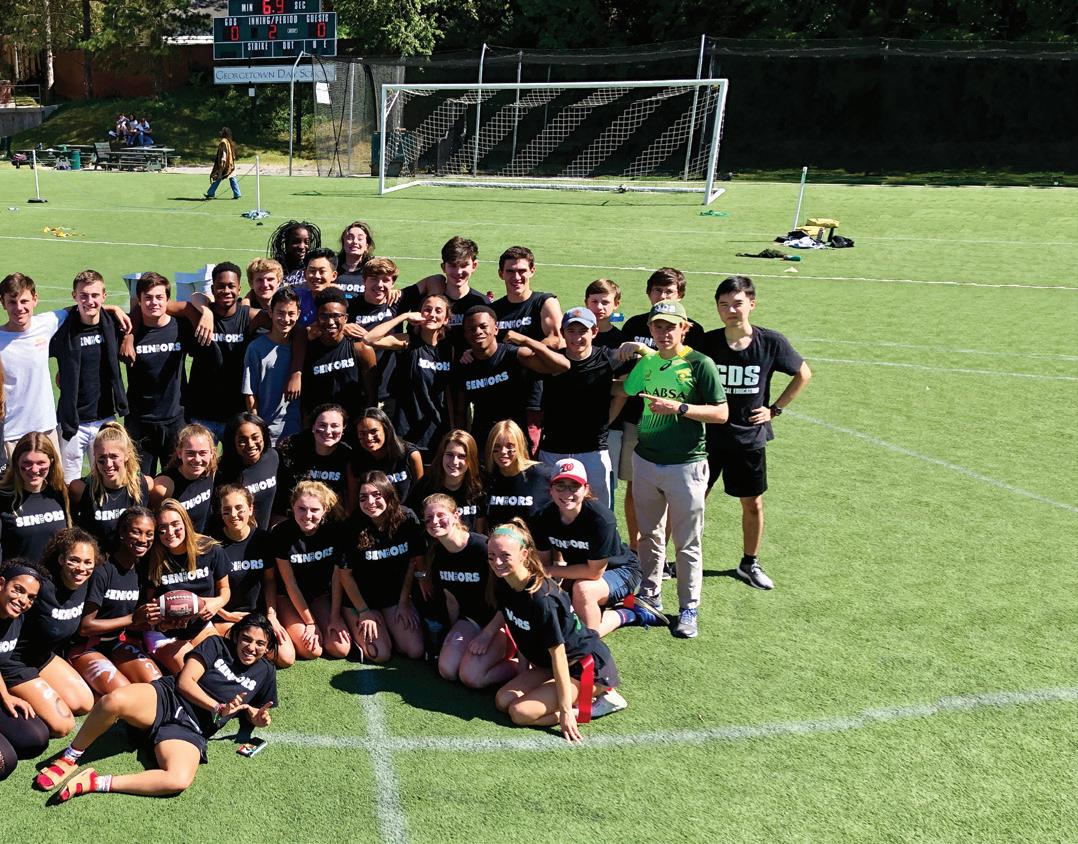
INTERNATIONAL
University of St Andrews (SCT) – 1 University of Toronto (CA) – 1
ENROLLED AT 73
Different Schools
25 STATES
Plus the District of Columbia, the United Kingdom, and Canada
DISTINCTIVE MATRICULATION CHOICES
Women’s Colleges (4 students) Historically Black Colleges & Universities (HBCU) (1 student) Art Schools – Visual and Performing (4 students) Recruited Athletes (7 students)
2020’S 8TH GRADE GRADUATION

FREED SPIRIT PHOTOGRAPHY
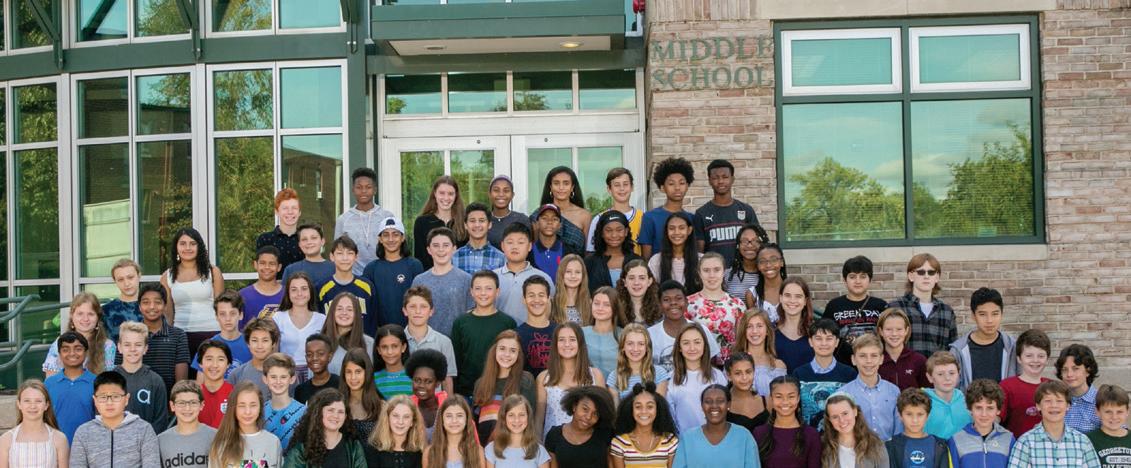
Friends and family from across the country and even around the world— more certainly than would have fit in our gym—attended the 8th grade graduation ceremony for the Class of 2024 virtually last May.
Eighth graders appeared dressed up for the occasion in their bedrooms, on the family couch, or at the kitchen table. Middle School Principal Debby Previna and Head of School Russell Shaw spoke during the ceremony, which also included a presentation of diplomas and a virtual dance party.
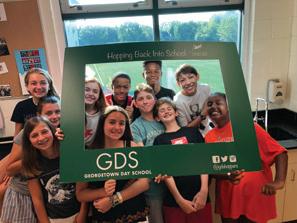
It’s true that in their final three months of Middle School, the Class of 2024 saw their 8th grade year veer wildly off course. Yet, as Debby explained, the students persevered to a “successful completion of 8th grade.” Beyond the quantifiable measures of success, Debby spoke to the accolades that transcended the “imperfect world.”
“As much as things have been challenging, we ask that you don’t lose faith in humanity or in yourself,” she said. “You have already been successful. You have made space for yourself and used your voice. You asked for help when you needed it, took care of the younger Middle Schoolers, and didn’t use your seniority to belittle but to set a model. You have remained intellectually curious, studious, and willing to jump in and struggle productively. Even while the grownups in your life can’t protect you from everything—but only some things—we are here for you now and forever. We look forward to all the ways you are going to create a more perfect and just world for us all to live in.”
Graduations, Russell explained, are a meaningful, liminal moment— positioned upon the threshold where one story is ending and the next is beginning. Even when faced with grief, the Talmud reminds us, he explained, to celebrate the fleeting moments of joy and accomplishment, like this 8th grade graduation. “Now is the time to celebrate,” he urged.
In a particularly personal moment, Russell shared a piece of wisdom that has guided him since he was a teenager. After a bullying incident left him dreading school, he found a note that his mother left beside his bed. “I am not made or unmade by the things that happen to me but by my reaction to them,” the message said. “Things will happen beyond your control,” Russell said, “and your job is to respond in the best way you can.”
As both Debby and Russell expressed, Georgetown Day School is grateful to have experienced the beauty, power, wit, competence, joy, and empathy of the Class of 2024.
“A look back at the Class of 2024 as they…hopped back into the first day of their final year in the Middle School
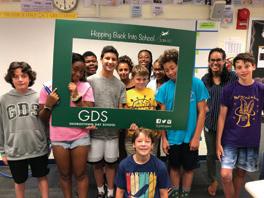
…and enjoyed the final Country Market Day on MacArthur Boulevard.”
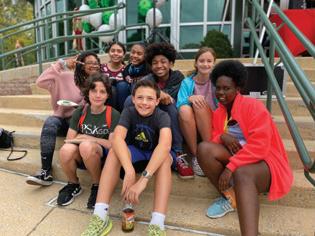
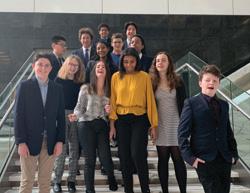
8th graders on Hill Day in February 2020
Together We Leap
INTO MIDDLE SCHOOL: 2020 4TH & 5TH GRADE PROMOTION CEREMONY
As GDS prepared to make the move from MacArthur Boulevard to Davenport Street in Spring 2020, 4th and 5th graders were preparing to make the leap from Lower School to Middle School. At the promotion ceremonies, Head of School Russell Shaw urged the students to bring with them to the new campus “a sense of responsibility not just for yourself, but for your grade, your school, your school community, and the world beyond our walls. The world needs you. It needs your kindness, your compassion, your voice, your care, and your courage to make a difference.”
As these rising Middle Schoolers were getting ready to say hello to new experiences in a new building, they were also saying goodbye to a place that meant so much to their early years of development.
They said goodbye to the Big Toy and hello to our incredible new playground, which will give them many new spaces to stretch their legs, climb, and be together outdoors! (See pages 44–45.)
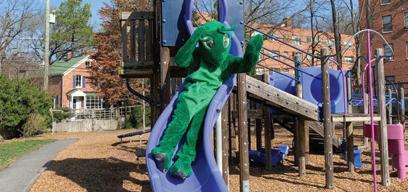
They said goodbye to the library, but brought the books to their new home, along with their willingness to continue exploring new worlds together in Middle School and beyond. They left behind the Blackbox and are eager to try out our new performing arts space, carrying with them the same sense of wonder and willingness to experiment and try new endeavors.
They said goodbye to familiar hallways and welcomed new gathering spaces, bringing along their commitment to community.
At the promotion ceremonies, attendees enjoyed a virtual band concert, a screening of the students’ February dance assembly performances, a reading of Peter H. Reynolds’s Say Something, and the sharing of favorite Lower School memories by the graduates.
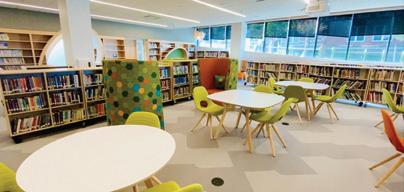
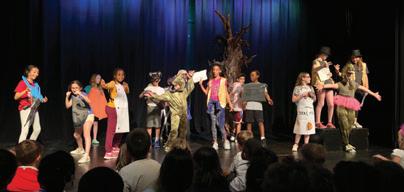
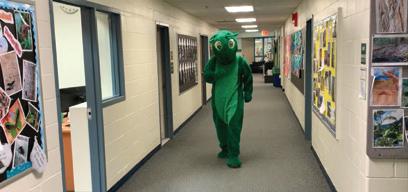
The classes of 2027 and 2028 are the first group of Middle School students to call our unified campus home. Along with their many gifts, we know our promoted students have brought with them cherished memories from their Lower School years.









